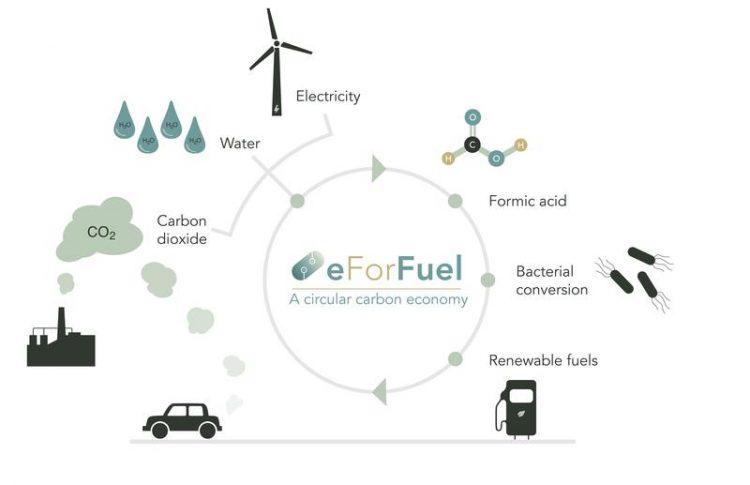eForFuel: Fuels from CO2 and Electricity

eForFuel © Biofaction
eForFuel is a Horizon 2020 EU project launched in March 2018 and scheduled to run for the next 4 years with funding of around 4 million Euros.
The project is led and coordinated by scientists at the Max Planck Institute (MPI) of Molecular Plant Physiology in Germany and boasts the participation of 14 industrial and academic partners from 9 European and associated countries.
eForFuel is a truly interdisciplinary project aiming to achieve its research targets of offering sustainable alternatives to fossil fuels.
Greenhouse gases (especially CO2) emitted from the burning of fossil fuels are significant drivers of climate change and a global threat to society and the environment. Hence, it is very important to replace fossil fuels with an alternative, sustainable sources.
Early generation 'biofuels' compete with land resources, limit agricultural production of food, and, therefore, cannot completely replace fossil fuels without severely undermining food security and decreasing biodiversity.
In order to overcome this problem, eForFuel provides a novel solution to utilize resources that are essentially unlimited and that are independent of land use: CO2, electricity and water.
“What makes eForFuel unique is the sustainable production chain that converts CO2 emissions and renewable electricity into easy to handle formic acid, which is then fed to engineered microbes for the production of renewable hydrocarbon fuels”, says project coordinator Arren Bar-Even from MPI.
eForFuel aims to establish and demonstrate a unique integrated electro-bioreactor, which automatically integrates CO2 electro-reduction, formate production and formate bioconversion to hydrocarbons that can serve as “drop in” fuels. This integrated system will serve as a stepping-stone towards transforming the way we produce fuels and carbon-based chemicals.
“We will support the process developers by continuously providing them with insights gained from life cycle assessment (LCA)”, explains Nils Rettenmaier from the Institute for Energy and Environmental Research Heidelberg (ifeu), leading scientist in the project.
ifeu from Germany will provide a key contribution to eForFuel by taking care of the integrated sustainability assessment. In collaboration with other project partners, the impacts of eForFuel products on the main pillars of sustainability will be assessed.
eForFuel, which was launched in March 2018 in Berlin, is a 4-year project funded by the European Union’s Horizon
Updates can be found at www.eforfuel.eu and on Twitter @eforfuel
Media Contact
All latest news from the category: Life Sciences and Chemistry
Articles and reports from the Life Sciences and chemistry area deal with applied and basic research into modern biology, chemistry and human medicine.
Valuable information can be found on a range of life sciences fields including bacteriology, biochemistry, bionics, bioinformatics, biophysics, biotechnology, genetics, geobotany, human biology, marine biology, microbiology, molecular biology, cellular biology, zoology, bioinorganic chemistry, microchemistry and environmental chemistry.
Newest articles

A universal framework for spatial biology
SpatialData is a freely accessible tool to unify and integrate data from different omics technologies accounting for spatial information, which can provide holistic insights into health and disease. Biological processes…

How complex biological processes arise
A $20 million grant from the U.S. National Science Foundation (NSF) will support the establishment and operation of the National Synthesis Center for Emergence in the Molecular and Cellular Sciences (NCEMS) at…

Airborne single-photon lidar system achieves high-resolution 3D imaging
Compact, low-power system opens doors for photon-efficient drone and satellite-based environmental monitoring and mapping. Researchers have developed a compact and lightweight single-photon airborne lidar system that can acquire high-resolution 3D…





















